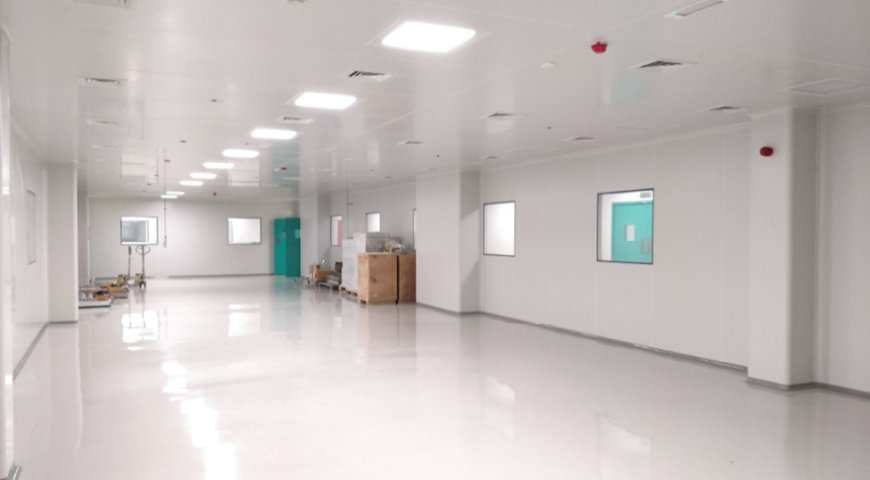Embracing the Future of Manufacturing with Modular Cleanrooms
Modular cleanrooms offer flexible, cost-effective, and high-quality contamination control for diverse industries, ensuring rapid deployment and customization.

In today's rapidly evolving industrial landscape, maintaining high standards of cleanliness and contamination control is more critical than ever. This is especially true in sectors such as pharmaceuticals, biotechnology, electronics, and aerospace, where even the smallest particles can compromise product quality and safety. Enter the modular cleanroom—a versatile, scalable, and efficient solution that is revolutionizing the way industries approach cleanroom design and construction. In this blog, we will explore the concept of modular cleanrooms, their benefits, and how they are shaping the future of manufacturing.
Understanding Modular Cleanrooms
A cleanroom is a controlled environment designed to minimize the presence of airborne particles, pollutants, and contaminants. Traditional cleanrooms are typically custom-built, requiring significant time, labour, and financial investment. Modular cleanrooms, on the other hand, are pre-engineered and prefabricated systems that can be assembled and configured to meet specific requirements. These cleanrooms consist of standardized panels, doors, windows, and other components that can be easily transported, installed, and reconfigured as needed.
The modular approach offers a high degree of flexibility, allowing businesses to quickly adapt to changing production needs or regulatory requirements. Whether you need a small, single-room cleanroom or a large, multi-room facility, modular cleanrooms can be customized to fit your exact specifications.
The Benefits of Modular Cleanrooms
1. Flexibility and Scalability
One of the most significant advantages of modular cleanrooms is their flexibility. As your business grows or your production needs change, you can easily expand or reconfigure your cleanroom without major disruptions. This scalability is particularly beneficial for startups and smaller companies that may need to adjust their operations as they develop new products or enter new markets.
2. Cost-Effective
Traditional cleanroom construction can be prohibitively expensive due to the need for specialized materials, labour, and extensive planning. Modular cleanrooms, however, are typically more cost-effective. The prefabrication process reduces material waste and construction time, leading to lower overall costs. Additionally, because modular cleanrooms can be easily relocated or repurposed, they offer a better return on investment compared to permanent structures.
3. Faster Installation
Time is of the essence in many industries, and modular cleanrooms offer a significant advantage in this regard. The prefabricated components can be quickly assembled on-site, reducing construction time from several months to just a few weeks or even days. This rapid deployment allows businesses to start their operations sooner and respond more quickly to market demands.
4. High-Quality Standards
Modular cleanrooms are manufactured in controlled environments, ensuring that each component meets stringent quality standards. This consistency in quality helps maintain the integrity of the cleanroom and reduces the risk of contamination. Additionally, modular cleanrooms are designed to comply with industry regulations and standards, such as ISO 14644 and GMP (Good Manufacturing Practice) guidelines.
5. Customization
Every industry has unique requirements when it comes to cleanroom design. Modular cleanrooms can be tailored to meet specific needs, including controlled temperature and humidity, air filtration, lighting, and more. This level of customization ensures that your cleanroom environment is perfectly suited to your production processes and regulatory requirements.
6. Sustainability
Sustainability is becoming an increasingly important consideration in modern manufacturing. Modular cleanrooms are inherently more sustainable than traditional construction methods. The prefabrication process reduces waste, and the ability to reconfigure or relocate cleanrooms minimizes the need for new construction. Additionally, many modular cleanroom systems are designed with energy-efficient components, helping to reduce operational costs and environmental impact.
Applications of Modular Cleanrooms
Modular cleanrooms are used in a wide range of industries, each with its own specific requirements and challenges. Here are a few examples of how modular cleanrooms are being utilized:
1. Pharmaceuticals and Biotechnology
In the pharmaceutical and biotech industries, maintaining a sterile environment is crucial for the production of drugs and medical devices. Modular cleanrooms provide a controlled space where contamination can be minimized, ensuring the safety and efficacy of products.
2. Electronics
The manufacture of electronic components, such as semiconductors and microchips, requires an ultra-clean environment to prevent defects and ensure product quality. Modular cleanrooms offer the precision and control needed for these high-tech applications.
3. Aerospace
Aerospace manufacturing involves the production of highly sensitive components that must meet stringent quality standards. Modular cleanrooms help maintain the necessary levels of cleanliness and environmental control required for aerospace applications.
4. Food and Beverage
In the food and beverage industry, contamination control is essential for ensuring product safety and compliance with regulatory standards. Modular cleanrooms can be used for processes such as packaging, filling, and quality control, where a clean environment is critical.
5. Research and Development
Research and development (R&D) labs often require flexible and adaptable cleanroom environments to accommodate a variety of experiments and processes. Modular cleanrooms can be easily reconfigured to meet the changing needs of R&D activities.
The Future of Modular Cleanrooms
As industries continue to evolve and new technologies emerge, the demand for modular cleanrooms is expected to grow. Advances in materials science, automation, and IoT (Internet of Things) integration are likely to enhance the capabilities and efficiency of modular cleanrooms even further. For example, smart cleanrooms equipped with sensors and automated systems can provide real-time monitoring and control, ensuring optimal conditions and reducing the risk of contamination.
In conclusion, modular cleanrooms represent a significant advancement in the field of contamination control. Their flexibility, cost-effectiveness, and high-quality standards make them an attractive option for a wide range of industries. As the demand for clean and controlled environments continues to rise, modular cleanrooms are poised to play a pivotal role in the future of manufacturing. By embracing this innovative approach, businesses can stay ahead of the curve, ensuring their products meet the highest standards of quality and safety.
What's Your Reaction?























